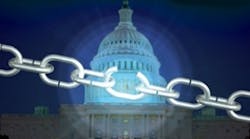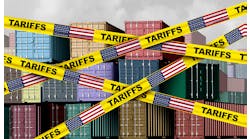In his first Inaugural Address in 1981, President Reagan famously ushered in the modern era of conservative thought when he observed that “government is not the solution to our problem. Government is the problem.” And for the last 30+ years, that core philosophy has been furiously debated on the left and on the right, with no clear answer to the question: What role should the government play in the daily lives of U.S. citizens?
While Republicans have occupied the White House 20 out of the past 32 years, the Democrats have controlled the House of Representatives for 18 of those years, and the two parties have each controlled the Senate for 16 years. So as fashions come and go throughout the years, so too do the reigning ideologies in Washington.
Do You Feel Over-Regulated?
According to at least one recent survey, there’s little doubt as to what U.S. manufacturers think about government: not much. The National Association of Manufacturers (NAM) and the National Federation of Independent Business (NFIB) polled small and mid-sized manufacturers, and got an earful on the theme of government being a barrier rather than an ally in their quest for prosperity. Nearly seven out of ten (69%) say that President Obama’s Executive Branch and regulatory policies have hurt American small businesses and manufacturers, and 55% say they would not start a business today given what they know now and in the current environment.
At a late September town hall meeting as part of Governor Mitt Romney’s campaign swing through Ohio, Mike Gordon, owner of Cleveland-based Tendon Manufacturing, said, “When it comes to government regulation, what some people don’t understand is when you have somebody as anti-business as [Obama] is, it goes through his entire organization. Regulators will come in and treat you like you’re some criminal and they’re trying to catch something.
On his campaign website, Romney sets forth his position on regulations as clearly in contrast with Obama’s. “A Romney administration will act swiftly to tear down the vast edifice of regulations the Obama administration has imposed on the economy. It will also seek to make structural changes to the federal bureaucracy, [ensuring] economic growth remains front and center when regulatory decisions are made.” If elected, he plans to roll back Obama-era laws and regulations.
What’s the Price of Progress?
Not surprisingly, President Obama takes a far different view of the role of government. “Government can’t solve every problem, but it’s not the source of all our problems either,” Obama said at a late September campaign stop on the campus of Kent State University. “If some company is polluting the air your children are breathing, well, that’s the price of progress.”
The oil companies in particular need to be held in check, he noted. “I’m not going to let oil companies write this country’s energy plan. And I’m sure not going to let them continue to collect $4 billion every single year in corporate welfare [i.e., government subsidies] from our taxpayers. They don’t need it. They’re making money every time you go to the pump.” That $4 billion instead should be invested in wind, solar and clean-coal technologies, he suggested.
Are You Paying Your Fair Share?
On his campaign website, the President notes that he has “cut taxes for every American worker and provided 18 tax cuts for small businesses to help them weather the recession.” If elected to a second term, he will increase taxes on millionaires and billionaires “so that we can pay down our debt in a balanced way.”
Governor Romney, on the other hand, has observed that “the U.S. economy’s 35 percent corporate tax rate is among the highest in the industrial world, reducing the ability of our nation’s businesses to compete in the global economy and to invest and create jobs at home. By limiting investment and growth, the high rate of corporate tax also hurts U.S. wages.” He has said that he would cut the corporate rate to 25 percent, while strengthening and making permanent the R&D tax credit.
Are You Better Off than You Were Four Years Ago?
Romney says President Obama had two options to rectify the economic crisis he faced upon his inauguration in 2009: to put faith in U.S. workers and businesses, or to put faith in government. The latter option, according to Romney, led to “more spending, more debt, more government regulation, more bureaucracy—ultimately, more control for Washington over the national economy,” and that was the option Obama chose.
Romney’s five-point plan for his administration focuses on: building energy independence; ensuring Americans have the skills to succeed; opening markets that work for America; cutting the deficit; and championing small businesses.
For his part, President Obama points to his rescue of the U.S. auto industry as an example of how his policies have benefited manufacturers. Before he took office, according to the President, the economy was losing 800,000 jobs a month. “Now, we’ve seen 30 consecutive months of job growth and 4.6 million new private sector jobs.”
Obama also has a five-point plan: exporting more products and outsourcing fewer jobs; control more of our own energy; ensure that everybody in America gets a great education; reduce the deficit without burdening the middle class; and to reform the tax code.
With the U.S. unemployment rate still hovering at 8% and more than 20 million people unemployed or underemployed, the election will ultimately center on whether voters believe President Obama is the architect of a soon-to-be-realized turnaround, or if in fact it’s time for a change at the top. The answer to these questions will come on November 6, 2012.
Josh Cable contributed to this article.




